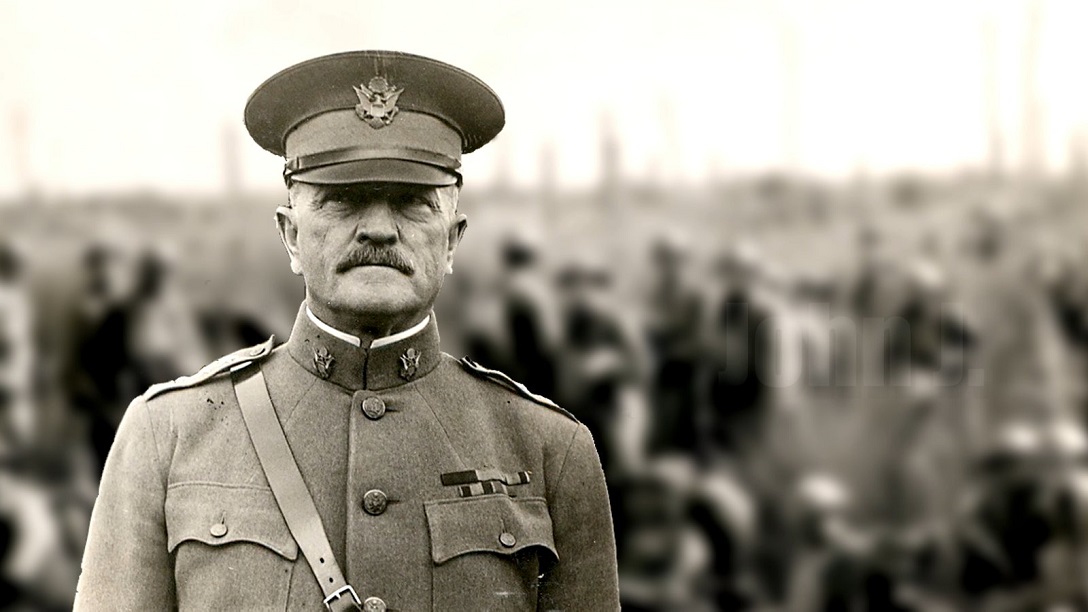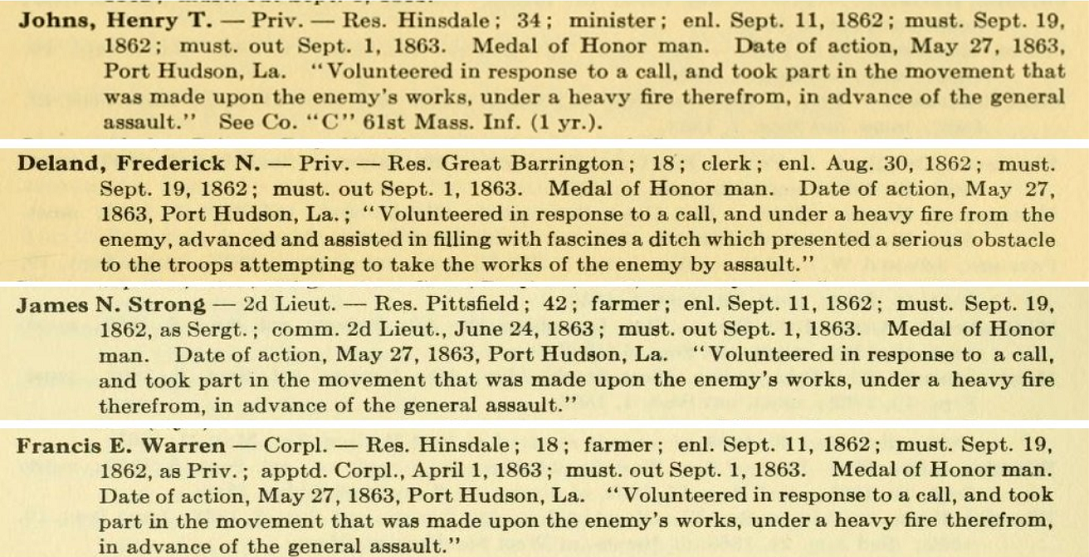Henry T. Johns and the 49th Massachusetts Volunteer Infantry
The “Massachusetts Soldiers, Sailors and Marines in the Civil War” Volume 5 listing for the 49th Massachusetts Infantry confirms his service in Company “C”.
 |
| (Source) |
When Henry T. Johns enlisted on September 11, 1862, he was a 34 year old minister from Hinsdale, Massachusetts, and was mustered in September 19, 1862, and Mustered out September 1, 1863. This mentions him as a “Medal of Honor man” to be discussed below. This regiment was supposed to serve for 9 months, but ongoing operations at Port Hudson delayed their departure for home and they actually served about 11 ½ months.
His history of the 49th, is comprehensive, and can be briefly summarized as preliminary training in Massachusetts, then provost marshal duties in New York City, followed by transport via steam ship south around Florida and up the Gulf of Mexico to the mouth of the Mississippi River, then upstream to the vicinity of Baton Rouge. Then they moved north a little more and were part of about 30,000 Union troops besieging about 8,500 Confederates in elaborate defensive positions at Port Hudson. These fortifications were comparable to later WW1 trench lines, and with the advantage of interior lines, the Confederates held out for a very long time. However, Union control of the Mississippi River and the encircling troops on the land side of Port Hudson eventually weakened the defenders and Union assaults finally forced them to surrender. This, and the fall of Vicksburg on July 4, 1863 split the Confederacy, and finally “… allowed the Mississippi to flow unvexed to the sea.”. |
| Port Hudson marked by red "X" (Source) |
 |
| Port Hudson location on the river and about 4.5 miles of Confederate defenses around the town. (Source) |
 |
| Confederate lines at Port Hudson after the surrender. (Source) |
borne diseases and fevers.
Henry T. Johns After the Civil War
- 1866-1868, Constable in Massachusetts.
- 1880 Census- Journalist- living at 1005 8th Street NW, Washington, DC, where two of his children were clerks in War Dept.
- 1900 Census- Government Clerk living at 301 Spruce St, Washington, DC
- Johns died May 13, 1906, buried in Oakland, California.
 |
| (Source) |
Note that his Veterans Administration grave marker erroneously lists him as 1st Lieutenant of Company C, 49th Mass. Inf, when he was actually only a Private in that regiment, and his service as a Lieutenant was with the 61st Mass. Inf.
Henry T. Johns and the Medal of Honor
 |
| The Medal of Honor, left to
right: 1862, 1895, 1904 “Gillespie”, and 1944 neck pendant versions. (Source) |
During the Civil War, there were no other military awards recognizing exceptional bravery on the battlefield. No Silver Stars, no Bronze Stars, no Commendation Medals. The Medal of Honor was the only option, and most were awarded some years after the war was over.
The entry for Private Henry T. Johns noted “Medal of Honor Man. Date of action, May 27, 1863, [8 days after he should have been discharged], Port Hudson, La. ‘Volunteered in response to a call, and took part in the movement that was made upon the enemy’s works, under a heavy fire therefrom, in advance of the general assault.’”
Basically these guys volunteered to be the leading elements of the attack on the Confederate fortifications, and they were to place fascines (bundles of branches, etc) in the ditches before the forts to enable the attackers to attempt to scale the walls. The advance party succeeded but the larger attack failed.
I
was not able to determine how many Medals of Honor were awarded to other units
at Port Hudson, but possibly up to a dozen more.
Corporal Francis E. Warren (1844–1929) is the bottom name on the list of men awarded the Medal of Honor along with Pvt. Henry T. Johns. Air Force folks may recognize the name as that of an Air Force Base in Cheyenne, Wyoming¹. It has no runways, but I am sure it has a nice golf course, from June to August.
Francis E. Warren, was an 18 year old farmer when he enlisted the same day as 34 year old minister Henry T. Johns in Company C of the 49th Massachusetts. Perhaps Warren attended Johns’ church, or perhaps not. The younger man attained the rank of Corporal while Johns remained a private the whole time he was in the regiment. Both won the Medal of Honor for the same action.
But, the young farmer from Hinsdale, Mass went to Wyoming in 1868, briefly working on the Union Pacific railroad in Iowa along the way. He arrived about the time Wyoming Territory was carved out of the former Dakota Territory, and the railroad was being extended further across Wyoming every day.
 |
| Downtown Cheyenne in 1869, a year after Warren arrived in the city. (Source) |
"Cheyenne at that time was a city of shanties and tents, camps and covered wagons. The population was migratory," Warren recalled in an interview with The New York Times a few months before his death. "The railroad having been built further to the west, everyone was discussing the probability of a permanent town, and the prevailing opinion seemed to be that in six months not much more than a stake would be left to mark the site of Cheyenne. ... For some reason I could not make myself subscribe to that gloomy prophecy."
Despite his attraction to Cheyenne, Warren quickly discovered that life in the rough-and-tumble town came with some discomfort and definite risks. He used a cot improvised from some pieces of packing boxes as his bed, and remembered later, "Every man slept with from one to a half-dozen revolvers under his pillow, for depradations [sic] of every character could be expected at any hour, day or night." (Source)
It was not until May 10, 1869 that the rails were joined at Promontory Point, Utah, and announced by telegraph “It is done.” In December 1869 the city of Cheyenne was incorporated (population 1,450 people) and as the largest city was made the capitol. The same day, women were granted the right to vote (the first in the country). Today, Cheyenne remains the capitol, and largest city, population all the way up to 65,132. Women still vote.
Warren engaged in real estate, mercantile, livestock, banking and utilities businesses, becoming quite wealthy, eventually reputed to be the richest man in the state.
 |
| (Source) |
He also became a Republican politician including: member, Wyoming Territorial Senate (1873–1874, 1884–1885), serving as senate president. Treasurer of Wyoming (1876, 1879, 1882, 1884); Member, Cheyenne City Council (1873–1874); and Mayor of Cheyenne (1885).
In February 1885, Warren was appointed Governor of the Territory of Wyoming by President Chester A. Arthur; removed by Democratic President Grover Cleveland in November 1886 and reappointed by President Benjamin Harrison in April, 1889, and elected first Governor of the state of Wyoming in October 1890. The new state Senate then appointed him to the U.S. Senate in November 1890, and he remained a Senator for 37 years until his death in 1929.
He had two children, and his daughter, Helen Frances, married CAPTAIN John J. Pershing in 1905, with President Roosevelt at the ceremony.
In 1905 Warren was chairman of the Senate Appropriations Committee and the Military Affairs Committee, when President Teddy Roosevelt wanted to promote Pershing to Colonel, but the Army refused. After a couple of quick job transfers, Roosevelt nominated him for promotion to Brigadier General, (skipping the ranks of Major, Lt. Colonel, and Colonel.) which only required Senate confirmation. Roosevelt got Senator Warren’s support for the most unusual promotion.
 |
| General of the Armies John Joseph Pershing (Source) |
So, a sword with a name takes history lovers to surprising discoveries.
¹ Editor's Note: LUSH was born there! I won't say how long ago it was, just that I was a much younger man back then.




Quite the informative dip into history, well done JB.
ReplyDeleteFascinating! A hint, too, at why ND, SD, MT, and WY don't also have a "four corners" meeting.
ReplyDeleteHistory is endlessly fascinating and interwoven in ways that we never expect until we start researching it. Fascinating research and well done, JB!
ReplyDeleteThis reminds me of untangling knots. The farther you get the more you find. Very interesting discoveries. Thanks for the write up!! Happy Christmas!
ReplyDeleteNice seasonal header image change there, Sarge!
ReplyDeleteMerry Christmas to all. May peace and joy prevail.
John Blackshoe
Thanks JB, another great post. Bravo Zulu!
Delete